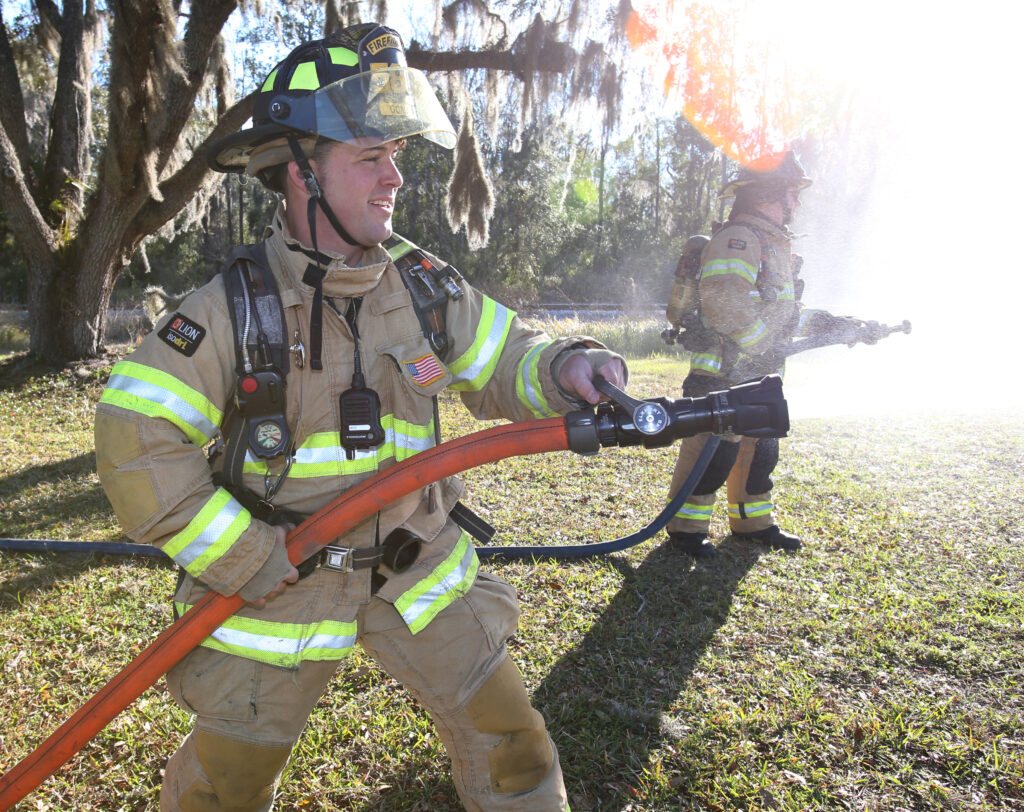Trial in Ocala fire fee lawsuit not assured

Tim Herff, a firefighter/paramedic, left, and Tommie Taylor, a fire equipment operator, right, both of Ocala Fire Rescue Station 1. [Bruce Ackerman/Ocala Gazette]
Despite the city preparing for trial, the court has yet to consider the question

Tim Herff, a firefighter/paramedic, left, and Tommie Taylor, a fire equipment operator, right, both of Ocala Fire Rescue Station 1. [Bruce Ackerman/Ocala Gazette]
Ocala is girding for a jury trial, hiring lawyers and expert witnesses to argue the city should pay less than the $81 million it illegally collected for fire services for almost a decade.
Trouble is that trial may never come.
Derek Schroth, the attorney for the plaintiffs in the case, filed a motion on Feb. 15 seeking clarification on the latest order by Judge Robert Hodges on the point.
In January, circuit court judge Robert Hodges entered an order adopting the 5th District Court of Appeal decision in “in its entirety” ruling that the “City of Ocala’s fire service fee was an unconstitutional tax and remanded the case solely for the establishment of a common fund to refund the illegally collected taxes.”
In regard to how to calculate the amount of the refund, Hodges’ order further stated “The fund shall potentially include an amount equal to all illegal taxes it collected” less the amount owed to those who opted out of the class action suit.
Schroth claims that the court’s use of the word “potentially” is creating confusion.
Currently, almost 100,000 utility customers make up the class who may qualify for refunds. Schroth indicates that only 529 utility customers have opted out of the suit and claims the city now owes the full amount it collected.
But at the Feb. 2 Ocala City Council meeting, Robert Batsel, an attorney for the city, told the council the final amount owned was still in dispute with “issues, like defenses such as set off that need to be considered, need to be dealt with appropriately” through litigation, “not just summarily handled” and that “we got agreement from the judge on that.”
In a set-off defense, the city would argue that it provided the fire services and should get a credit to set-off the damages the court will award the Plaintiff.
Scroth claims the city lost its opportunity to bring up the defense.
“The city’s set-off defense was before the appellate court on appeal and the appellate court ordered refunds of the illegal taxes the city collected. The appellate court rejected all the city’s arguments,” Schroth wrote in an email.
But during his opening statement in the 2019 trial, Schroth argued otherwise indicating that the set-off defense was something to be heard after the court decided if the fee was illegal. That determination has finally happened.
“In this case the city did not argue that on appeal or at summary judgment and thus waived it. The appellate court ordered the refunds without anyone having to request supplemental relief,” Schroth wrote.
Schroth also argued the set-off defense does not apply in the case.
“There is no set-off defense in an illegal taxation case. The law in Florida is when the government illegally takes your money through coercion, as determined by multiple judges in this case, you have a right to a refund. The appellate court confirmed in two separate opinions refunds are the remedy when the government illegally takes your money,” he wrote.
At Tuesday’s city council meeting, Batsel told the councilmen he was moving forward with trial preparation. He said its insurance provider would begin paying the city’s attorney’s fees and trial costs for the case. They hired two attorneys, Thomas Cloud and Jason Zimmerman, who specialize in class action defense and municipal and public assessments. They also retained Hank Fishkind, an economist, as an expert witness.
Despite the city’s preparations, Schroth said Hodges has not moved toward setting a jury trial.
“No action has been taken to schedule another trial because the city is not entitled to another trial after it already lost. The city is required to refund the money it illegally took,” he wrote.
Batsel declined to comment on the progress of scheduling the trial citing ethical reasons.
Since the Florida Supreme Court has denied hearing the case, local judge Hodges, with or without a jury trial, will be answering the question of how much the city owes the Plaintiffs.
Councilman Jaye Musleh says negotiations for settlement have stopped.





